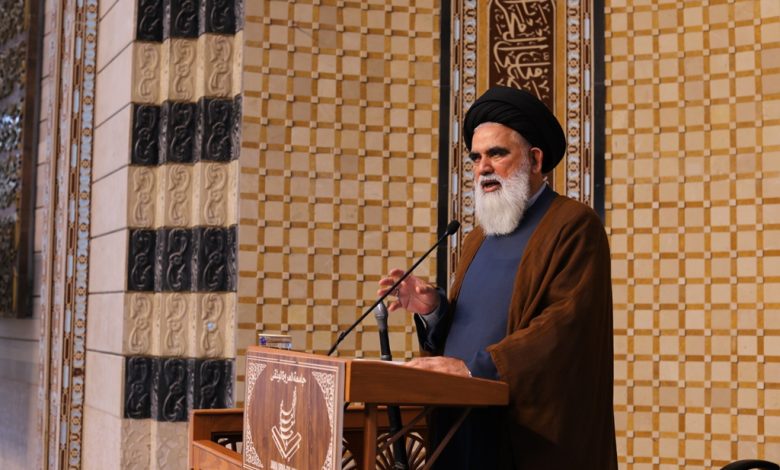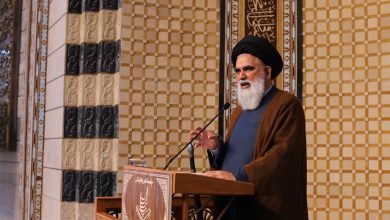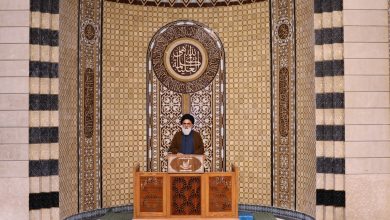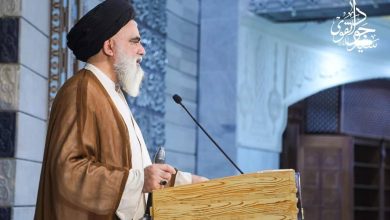
Social Taqwa can protect us from Fitnah of this era/ Traditions on how much Imams hated Ghaali’s
Hujjatul Islam Ustad Syed Jawad Naqvi
(Principal Jamia Orwatul Wuthqa – Lahore)
Delivered at: Masjid Baitul ul Ateeq
Lahore – Pakistan
Friday Sermon 5th April – 2025
Sermon 1 : Social Taqwa can protect us from Fitnah of this era
Sermon 2: Traditions on how much Imams hated Ghaali’s
Fitnah exists in society, and one aspect of Taqwa is to protect against it. As previously mentioned, Fitnah refers to the process of purification through tests, historically associated with refining gold to remove impurities. Today, we conduct various analyses, such as blood tests, to separate components, often using methods that involve melting substances to isolate their parts—a process known in Arabic as “Fatan.” This term, originally derived from industry, particularly pertains to goldsmithing, has been adapted in the context of societal issues in the Quran.
In examining any society, we often find a mix of cultures, ancestral traditions, and numerous other influences. When these elements become adulterated, the entire system can become chaotic, hindering growth and diminishing effectiveness. Impurities tend to deteriorate naturally over time. While certain natural elements should remain untouched as they are essential, the mixing and corruption can fundamentally harm society.
Our bodies possess natural defensive systems, such as hair, nasal hairs, and skin, that protect against various intrusions. Internally, a more intricate defense works to eliminate any impurities that may enter. Similarly, societal dynamics require protection against damaging influences like Fitnah. Allah (a) has established a protective system for society through Taqwa, which requires human implementation, as society relies on individuals acting with reason and judgement. One of the most significant threats to society is Fitnah, which the Quran makes clear we must be prepared for. For instance, the Surah Ankaboot begins with a warning:
أَحَسِبَ النَّاسُ أَنْ يُتْرَكُوا أَنْ يَقُولُوا آمَنَّا وَهُمْ لَا يُفْتَنُونَ {2}
[] Do men think that they will be left alone on saying, We believe, and not be tried?
وَلَقَدْ فَتَنَّا الَّذِينَ مِنْ قَبْلِهِمْ ۖ فَلَيَعْلَمَنَّ اللَّهُ الَّذِينَ صَدَقُوا وَلَيَعْلَمَنَّ الْكَاذِبِينَ {3}
And certainly We tried those before them, so Allah will certainly know those who are true and He will certainly know the liars.
Do people think they will be left alone because they say, ‘We believe,’ and will not be tested? Indeed, We tested those before them, and Allah will surely make clear those who are truthful and He will make clear the liars.
The Quran reminds us that the mixing of truth and falsehood leads to confusion and negativity. In a community where the righteous and corrupt coexist, the outcome can never promote faith but rather lead to transgression and decay. Assuming everyone will be forgiven in a corrupt society where few righteous individuals exist is a misconception; rather, it is through Fitnah (tests) that the pure are distinguished from the impure.
Fitnah often manifests harshly, akin to a social fire requiring individuals to protect themselves from being engulfed. Every generation faces Fitnah, but our current one confronts it more than ever. Amirul Momineen (a.s) provided profound insights on these challenges in his sermons, marking his era after the Prophet (s) as one rife with Fitnah. The society of that time witnessed significant degradation, with numerous challenges besetting Ali (a) during his governance, as he sought to address these Fitnah. My discourse on this subject culminated in a book titled “Last Era of Fitnah,” which explores various aspects of this theme.
When a community succumbs to Fitnah, it distinguishes believers from transgressors, especially when believers become entangled in the schemes of Fitnah. Take, for example, the situation in Gaza, which has divided Muslims into distinct factions. Among eight billion believers, the question arises: how many genuinely act as believers? Amirul Momineen (a) illustrated how Fitnah originates, likening it to human birth: it begins as a single drop of semen, nurtured in a womb, until it eventually emerges. Some individuals foster and propagate this Fitnah, enabling it to grow powerful enough to evade confrontation, ultimately leading to widespread destruction. From inception, Fitnah is blind and obliterates everything in its path, serving as a lesson for future generations.
Ali (a) noted that the most misguided scholars arise during times of Fitnah, actively fueling its spread, a phenomenon we can observe in contemporary society.
In Surah Anfal , verse 25
يَا أَيُّهَا الَّذِينَ آمَنُوا اسْتَجِيبُوا لِلَّهِ وَلِلرَّسُولِ إِذَا دَعَاكُمْ لِمَا يُحْيِيكُمْ ۖ وَاعْلَمُوا أَنَّ اللَّهَ يَحُولُ بَيْنَ الْمَرْءِ وَقَلْبِهِ وَأَنَّهُ إِلَيْهِ تُحْشَرُونَ {24}
O you who believe! answer (the call of) Allah and His Messenger when he calls you to that which gives you life; and know that Allah intervenes between man and his heart, and that to Him you shall be gathered.
وَاتَّقُوا فِتْنَةً لَا تُصِيبَنَّ الَّذِينَ ظَلَمُوا مِنْكُمْ خَاصَّةً ۖ وَاعْلَمُوا أَنَّ اللَّهَ شَدِيدُ الْعِقَابِ {25}
And fear an affliction which may not smite those of you in particular who are unjust; and know that Allah is severe in requiting (evil).
The verse emphasizes the necessity of acquiring Taqwa, highlighting that Fitnah is not only a concern for the oppressors but poses a threat to everyone except for those who possess Taqwa. If individuals fail to attain this state, they not only risk destruction by Fitnah but also face divine punishment, resulting in a double penalty for those caught in its grasp. Throughout the world, both the East and the West recognize that we are living in an era rife with sedition. Without Taqwa, individuals will find themselves consumed by Fitnah, akin to wood reduced to ashes.
Today, many Muslims appear to be indifferent and shameless in the face of the ongoing Fitnah. How else can we explain the extent of Israel’s oppression of Palestine, which includes the tragic killing of children while proclaiming that 49,000 children have become orphans in Gaza? Surrounding Palestine are over fifty Muslim countries—from East to West—who witness this suffering yet appear to have become accustomed to the Fitnah that surrounds them.
The experiences from the time of Ali (a) resonate today as we observe the treatment of Muslims worldwide. Ali (a) warned that the most misguided scholars exist during times of Fitnah, and we can see their influence today in the context of Gaza. The only sanctuary from this ordeal is Taqwa. The Quran implores us to safeguard ourselves with social Taqwa against the Fitnah that threatens to engulf both the oppressors and the oppressed. The essence of resistance lies in that Taqwa, which serves as our shield. If we do not stand resolutely against Fitnah, we jeopardize our protection and risk annihilation.
Both the Quran and Ali (a) present this Fitnah as a constant threat. We will delve deeper into this topic, and I pray that Allah grants us the strength and guidance to remain safeguarded from such Fitnah.
SERMON 2
Allah has provided us with guides for Taqwa, including the Prophets and Imams, with Ali (a) serving as a prominent role model. However, when someone began teaching Nahjul Balagha in Qom, they faced criticism, suggesting that only those lacking in knowledge would resort to teaching it alongside the Tafseer of the Quran. This criticism contributed to the neglect of Nahjul Balagha in Qom, leading to a situation where very few scholars turned to it for guidance.
Nahjul Balagha presents religion as a fully developed system, whereas the Quran offers religious teachings in a more fundamental form that requires refinement into a structured system. In Nahjul Balagha, the principles of religion are articulated in a more sophisticated and organized manner. The text particularly identifies areas where individuals are likely to stumble, while also recognizing certain domains where the risk of error is minimal. It is generally understood that slipping regarding the personality of Ali (a) should be unlikely; however, Ali (a) himself acknowledges that two categories of people have indeed faltered
.وَ قَالَ عليه السلام: هَلَكَ فِيَّ رَجُلَانِ مُحِبٌّ غَالٍ وَ مُبْغِضٌ قَالٍ
Two categories of persons will face ruin on account of me: he who loves me with exaggeration, and he who hates me intensely.
Today, the animosity from the Nasibis has reached an all-time high, and the practice of Ghuluw (exaggeration) has become widespread among scholars who believe that their acceptance by the public hinges on such exaggerations. The Imams (a.s) made significant efforts to shield Shiites from Ghuluw, recognising that the external attacks faced by Shiites differ from the internal ones. While most people remain vigilant against outside threats, they often overlook the insidious dangers that erode from within, akin to termites consuming wood. A significant portion of the Shiite community’s resources has been dedicated to defending against the assaults from other sects, such as the Takfiris, while internal threats must also be addressed.
During the time of the Imams (a), prominent threats included the Banu Umayyah and Banu Abbas, yet the Imams paid equal attention to the internal dangers posed by Ghuluw. Allama Majlisi has dedicated an entire chapter in Biharul Anwar (Chapter 10) to Ghuluw, compiling traditions that deny Ghuluw in relation to the Prophet (s) and the Imams (a).
One such tradition, Tradition No. 5, features the Prophet (s), who cautions: “Do not exceed my rightful status; Allah chose me as His servant before making me a Prophet.” This highlights the importance of maintaining the humility of the Prophet and the Imams.
In Tradition No. 6, Imam Sadiq (a) warns about the influence of Ghaali, stating: “Beware regarding your children and youths; do not allow Ghaali to corrupt them. Ghaali are among the most wicked of Allah’s creations, for they initially malign the status of Allah. The corruption and shirk of Ghaali exceed that of Jews, Christians, and Zoroastrians. If a Ghaali or a Muqassir approaches me, I will not even permit a Ghaali to sit near me. However, I would accept a Muqassir who criticizes us.” When questioned about this, Imam (a) explains that Ghaali practices negligence towards obligatory acts like prayer, fasting, and Hajj, indicating that they lack genuine faith and will not repent or submit to Allah. Conversely, those who oppose our status but do not deny the religion can potentially leave their enmity behind upon recognising the truth, while a Ghaali will never reform, even after repentance.
Today, believers are often entertained by misrepresentations of Allah, portraying Him as weak or diminished to elevate the status of Ahlulbayt (a). Such narratives are propagated from our pulpits and disseminated through media channels. We witness these distortions regularly, yet neither scholars nor the community seem inclined to resist them. Some attempt to depict the Prophets as inferior to the Imams, but the dignity of the Imams does not require the denigration of others. It is commonplace within society to lift oneself by disparaging others, but those who are truly great stand on their own merit without the need to belittle others.
The companions of the Prophet (s) are not a monolithic group; they hold different statuses. Certain companions are valued and praised by Ali (a) in Nahjul Balagha, where he acknowledges their attributes and contributions. If Ali (a) respectfully highlights the status of these companions, why should we diminish their worth? Instead, we should recognise their merits and position Ali (a) as the greatest among them. Ghaali find comfort in belittling the Prophets, and this constitutes shirk. Their acts of defaming Allah represent a grave sin, as they deny His omnipotence and elevate the status of Allah’s servants above their place.
Ghuluw is not exclusive to Shiism; it also pervades Ahle Sunnah, as seen with figures like Ghaus-ul-Azam, and can be found universally. It is common to exaggerate the status of political figures, scholars, and Fuqaha. We must appreciate the greatness of each individual without elevating scholars to the status of Ahlulbayt (a) or Ahlulbayt (a) to the status of Allah. Imam Sadiq (a) cautions us to shield our future generations from Ghaali.
It is noteworthy that Imam (a) expressed a willingness to accept a Muqassir but not a Ghaali, leading to questions about this stance, especially given that Muqassir may also be followers. In another tradition, Imam Ali (a) implores Allah: “O Allah, deprive your mercy, guidance, bounties, help, and forgiveness from these Ghaali forever. I am weary of their presence.” This Ghuluw, often presented to believers as admirable attributes, is, in fact, the most detested form of religion by Ahlulbayt (a). Additional traditions further emphasise the necessity of severing ties with those who engage in Ghuluw.
I would like to specifically about Mrs Pasha who has passed away because she has that lady who took the first step in establishing Ummul Kitab our female seminary as we had no funds at that time. This day at that time came to the door of Jamea , she was 80 yrs + and came to me and said that I am going for Ziarat and came with ten million rupees to give us as she said I might not return as I am aged. It was those days when the foundation of women seminary was laid and we have no financial support. This was her savings from several years. Hence like this women and also who have placed their rights, services for this institute and this beautiful mosque the students should pray and remember them. This lady took a step at an important time and today this institute is a great one for women education. May Allah bless her and grant us a big status, and grant opportunity to her for serving religion.




